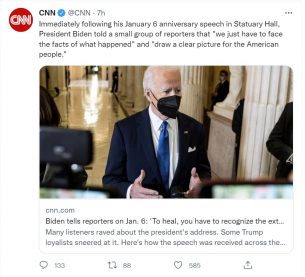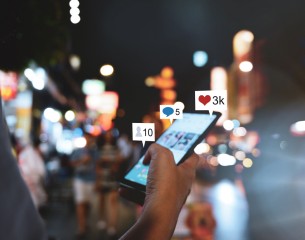
News consumption through social media is becoming more and more prevalent. Studying how people interact with social media, and particularly with the news when delivered via different social media channels, can be helpful in the marketing and communications spaces. Commenting on social media posts is an increasingly popular way to…
Read more
This column by University of Florida Brechner Center for Freedom of Information Director Frank LoMonte originally appeared on Inside Higher Ed on Dec. 13, 2021. Reprinted with permission. Social media is an empowering leveler for millions of young users. It gives teenagers a vast outlet to connect with faraway peers…
Read more
Recruiting participants for health-related research is always a challenge for researchers and often they turn to social media to help them out with advertising and promoting their needs. But as University of Florida researchers Elizabeth Flood-Grady, Lauren B. Solberg, Claire Baralt, Meghan Meyer, Jeff Stevens, and Janice L. Krieger point…
Read more
Jieun Shin, University of Florida College of Journalism and Communications Media Production, Management, and Technology assistant professor, is featured in “Ways to Make Social Media Less ‘Viral’” published in the Financial Times on Nov. 23. Fake news can spread like COVID-19 and social media platforms have options to stop it.…
Read more
Social media began as a way to connect with friends and family, but in recent years, it has also become a lucrative business tool. Social media can be a convenient, affordable and interactive way for companies and public relations practitioners to deliver organization-related messages in real time, communicate with their…
Read more
Doctoral student Yoo Jin Chung is in her final year of doctoral program in advertising, working on a dissertation that explores social media users parasocial relationship with virtual influencers. She was interviewed on Sept. 7, 2021 about her research on AI-enabled virtual influencers on social media, and how social media users…
Read more
One third of the most popular cancer treatment articles on social media contain misinformation. Further, the vast majority of that misinformation has the potential to harm cancer patients by supporting approaches that could negatively impact the quality of their treatment and chances for survival. Those are the findings from a…
Read more
The term “woke” is relatively new. To be woke means to become aware of social issues, such as discrimination, injustice, and stereotypes. Woke advertising is when brands capitalize on these issues and appropriate them in advertising narratives. The goal is to increase sales via a carefully cultivated brand identity that…
Read more
Does social media use lead to greater life satisfaction or self-esteem? Does it lead to better moods? When does social media use lead to positive or negative emotional responses? It is a well-known perspective that social media is bad for one’s self-esteem and overall mental well-being. But existing evidence for…
Read more
By Kun Xu, Telecommunication Assistant Professor in Emerging Media with support from Tianjun Shen at NYU Shanghai. One week ago, I posted a message on Twitter asking my friends whether they could invite me to join the Clubhouse app. The new app, which launched last year, is an invitation-only, audio-based…
Read more
Matt Duffy, University of Florida College of Journalism and Communications Master’s student, is featured in “Born Zillennial: UF Graduate Student Creates Viral Online Community” published in The Independent Florida Alligator on Nov. 8. Duffy created the Born Zillennial Facebook Group as part of a semester-long project for his Social Media…
Read more
Sylvia Chan-Olmsted, University of Florida College of Journalism and Communications Telecommunication professor and Media Consumer Research director, and doctoral student Sunny Yufan Qin are the authors of “The Effect of News Consumption on Fake News Efficacy” published in the Journal of Applied Journalism & Media Studies on Oct. 29. Chan-Olmsted…
Read more